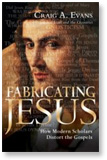Ray Van Neste and Denny Burk have started a web site for the co-sponsoring of an amendment dealing with the minimal doctrinal requirements of the Evangelical Theological Society (ETS). For an introduction to the site, see the changes that they want to make below:
= = = = = = = = = =
Read Amendment
Before introducing the amendment to you, a little background is in order. In 2001 at the 53rd annual meeting of the ETS, Ray Van Neste proposed that the ETS adopt the doctrinal basis of the U.K.’s Tyndale Fellowship. The Tyndale fellowship unites around evangelical truths a broad group of Christian scholars from varying denominational and theological perspectives (Calvinists, Wesleyans, Baptists, Anglicans, etc). The members of the Tyndale fellowship agree to the statement of belief used by the U.K.’s Universities and Colleges Christian Fellowship (UCCF).
The current ETS doctrinal basis has two parts: (1) a statement on inerrancy, and (2) a statement on the Trinity. It reads as follows:
“The Bible alone, and the Bible in its entirety, is the Word of God written and is therefore inerrant in the autographs. God is a Trinity, Father, Son, and Holy Spirit, each an uncreated person, one in essence, equal in power and glory.â€
We are proposing that the ETS adopt the UCCF statement with the current doctrinal basis of the ETS incorporated into it. One other addition defines the “written word of God†as the 66 books of the Old and New Testaments. So we propose to amend the current doctrinal basis as follows (underlined words indicate where the current doctrinal basis has been incorporated into the UCCF statement):
ARTICLE III. DOCTRINAL BASIS
1. The Bible alone, and the Bible in its entirety, is the Word of God written and is therefore inerrant in the autographs. This written word of God consists of the 66 books of the Old and New Testaments and is the supreme authority in all matters of belief and behavior.
2. God is a Trinity, Father, Son, and Holy Spirit, each an uncreated person, one in essence, equal in power and glory.
3. God is sovereign in creation, revelation, redemption and final judgment.
4. Since the fall, the whole of humankind is sinful and guilty, so that everyone is subject to God’s wrath and condemnation.
5. The Lord Jesus Christ, God’s incarnate Son, is fully God; he was born of a virgin; his humanity is real and sinless; he died on the cross, was raised bodily from death and is now reigning over heaven and earth.
6. Sinful human beings are redeemed from the guilt, penalty and power of sin only through the sacrificial death once and for all time of their representative and substitute, Jesus Christ, the only mediator between them and God.
7. Those who believe in Christ are pardoned all their sins and accepted in God’s sight only because of the righteousness of Christ credited to them; this justification is God’s act of undeserved mercy, received solely by trust in him and not by their own efforts.
8. The Holy Spirit alone makes the work of Christ effective to individual sinners, enabling them to turn to God from their sin and to trust in Jesus Christ.
9. The Holy Spirit lives in all those he has regenerated. He makes them increasingly Christ-like in character and behavior and gives them power for their witness in the world.
10. The one holy universal church is the Body of Christ, to which all true believers belong.
11. The Lord Jesus Christ will return in person, to judge everyone, to execute God’s just condemnation on those who have not repented and to receive the redeemed to eternal glory.
As stated above, the UCCF statement unites a broad constituency of evangelicals in the U.K. We think there is great potential for it to be a unifying doctrinal basis for the various evangelical constituencies represented in the ETS as well.
= = = = = = = = = =
The current supporters of this amendment can be found here at this link.




